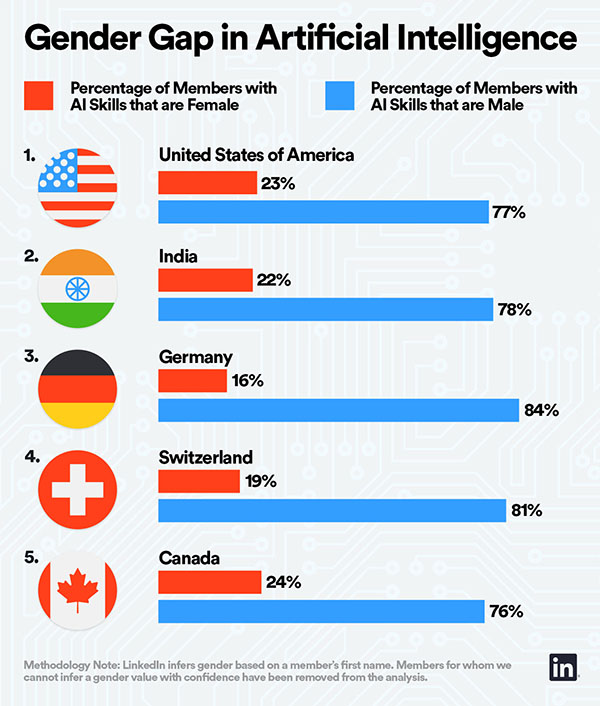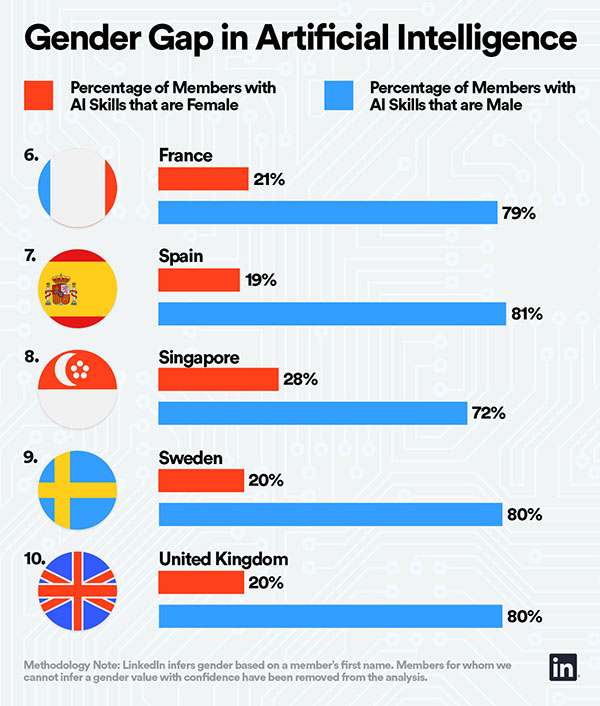For the past years, gender equality has been a recurring theme in many areas. Many Businesses are pushing to get a more diverse workforce and trying to integrate women in areas that are, traditionally, overwhelmingly populated by men. However, in the tech sector there is still a lot of work to be done, especially in bleeding edge tech, like AI.
Tech isn’t just in the Tech sector anymore…
Artificial Intelligence is one of those trending sectors right now. Everyone has heard about it and we are actually using AI in our daily lives, when we ask Alexa for the weather in London or Siri to set an appointment for next Monday. The AI market is valued at over 94 billion dollars currently and is expected to grow over 38% until 2030, following estimations from Gartner. The drivers behind this growth are the new uses of generative AIs like ChatGTP or Google Bard, advances in robotics, the digital assistants many of us use, self-driving cars and all the Smart Home gadgets we like to use.
In this day and age, every sector is becoming a technology sector in its own way. Digital technologies are completely pervasive in almost every area of our work or personal lives. However, despite this, studies from UNESCO show that “…women and girls are 25 per cent less likely than men to know how to leverage digital technology for basic purposes, 4 times less likely to know how to program computers and 13 times less likely to file for a technology patent…”. Which is sad if we remember that we live in 2023.
Since the beginning of the Industrial Revolution, the role of women in technology or the sciences has been very small, although with notable exceptions like, for example, Ada Lovelace. Although the entry barriers and the bias toward the “fairer sex” they faced in those times have largely disappeared, only about 20% of employees in technical roles at major Machine Learning companies are women. And the numbers get worse if we look at the percentage of female AI researchers: only 12% are women. And this figure halves again when we talk about professional developers in the field: just a mere 6% are female. Bearing in mind that women make up the 49,6% of the planet’s population the resulting figures are really low.
The reasons are, in part, systemic barriers that prevent women from pursuing careers in science and technology. One of those is the gender pay gap. In the EU, in 2021 women earned an average of 13% less than their male counterparts. In the US this figure is even higher: in 2022 women had an average income that was 18% lower if compared to men in the same position.

Why aren’t there more women in AI?


Source: LinkedIn
There are a couple of reasons why women don’t choose a technical career, especially one oriented to artificial intelligence or machine learning. Here are some of them:
- Lack of role models. Young girls or teenagers have very few women in the field to look up to, so it’s more difficult that the interest for a career in tech will be sparked.
- Lack of encouragement. Another factor is that girls aren’t usually encouraged to pursue a path in tech and are subtly directed to more stereotypical fields. Sometimes any career in STEM isn’t actually presented as an option. The result is fewer females in university tracks that lead to AI or ML.
- Lack of retention. Some studies show that women that enter the AI sector tend to leave sooner than their equivalent male counterparts. The reasons are not clear, but an overwhelmingly male dominated field, gender pay gaps and a glass ceiling to get to high level senior positions all contribute. If you take a clear career path from someone, it’s more likely that she will consider other fields in which advancement is possible.
- Lack of work/life balance. The tech industry is arguably amongst the most demanding sectors, on top of fast-changing. This can result in a less-than-attractive scenario to some women as they, in more cases than not, are more in charge of their children than their partners. Fortunately, this is changing, but still. Balancing a demanding job with family life isn’t easy for anyone, so many women will end up choosing family over work. At least the pandemic has given us one positive thing: working remotely now is seen as normal.
If you add all of this up, you can see that the resulting scenario is less than ideal to further equal opportunities for women in the high-tech field. In 1984 37.1% of Computer Science degrees in the US were awarded to women. Only 14 years later, this had dropped by almost 10%.
Notable women in AI
Despite AI being a field that is currently male dominated, women have made significant contributions to the development and application of AI technologies over the past 4 decades.
Elaine Rich was instrumental in the development of natural language processing (NLP) and expert systems. Rich’s work helped to establish the foundations of AI research and paved the way for future developments in the field.
Cynthia Solomon was a pioneer in the use of computers in education and developed Logo, a programming language specifically designed for children, which helped to promote the use of computers in education and made programming accessible to a wider audience.
Barbara Grosz was instrumental in the development of natural language processing and multi-agent systems. Grosz’s work helped to establish the foundations of AI research in these areas and laid an important groundwork.
Fei-Fei Li is a leading researcher in computer vision, creator of ImageNet and has helped to pioneer the use of deep learning in image recognition and analysis.
Anca Dragan is a leading researcher in human-robot interaction and has made significant contributions to the development of AI systems that can interact with humans in more natural and intuitive ways.
Overall, women have played an important role in the development and application of AI technologies over the past 50 years. Despite facing systemic barriers and biases, women have made significant contributions to the field and have helped to establish the foundations of AI research in a wide range of areas. As the field of AI continues to evolve and grow, it is important that we continue to support and encourage the participation of women and other underrepresented groups in the field. By doing so, we can ensure that AI technologies are developed in a way that is ethical, responsible, and inclusive.

